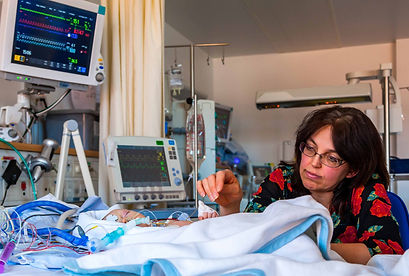
FAMILY STORIES
GREGORY'S STORY
Gregory was born with Hypoplastic Left Heart Syndrome (HLHS), a severe congenital heart defect where the left side of the heart is underdeveloped and can’t pump blood to the lungs. He underwent the first of three surgeries to help the functioning side of his heart to do the work of the whole. He spent three months in the Pediatric Cardiac Intensive Care Unit with his mother and family by his side.
With limited paid maternity leave, Gregory’s family started depleting their savings to pay their mortgage and household bills. Between those and the daily costs of parking and meals at the hospital, the family was under financial stress.

Although Gregory was able to go home between his surgeries, by law it is required that one parent commits to being a full-time caretaker. Gregory would need intensive daily monitoring, dependent on oxygen support and feeding tubes. Gregory’s mother committed to his in-home care, reducing the family to a single income. Additional costs like home nursing further created financial trauma, but the family understood how precious this time was for the family to spend time at home with Gregory to allow him to bond and grow.
This essential presence can come at great cost to families who must choose between work or care for their child or caring for their other children at home.
REALITY
Congenital Heart Families like Gregory’s immediately discover that someone needs to be with the baby as much as possible. This may mean having to give up employment and the resulting loss of that income. It may mean leaving other children at home and worrying about childcare and food. There may be transportation issues for one-car families, and incidental costs, like parking, meals, and overnight stays that become anything but incidental after weeks and months.
JAVIER'S STORY
Meet Javier, a 4-month-old boy who was admitted to the hospital for post-operative care. As with many families, having a little one in the hospital puts tremendous strain on family members both financially and emotionally. Javier’s family experienced that during his early days, and now they faced it again for Javier’s post-op care.
Javier comes from a loving family with three older school-aged siblings and working parents. They live an hour away from the hospital. Javi’s parents have low-income jobs that don’t provide any paid time off nor paid parental leave. The family has one car which the father used for work. They struggled with the question of “what do you do when your

baby is in the hospital?” Javi’s mother quit her job so she could be there to help with Javi’s care. She took the train to and from the hospital each day. Between loss of income and now having to pay for transportation to/from the hospital as well as paying for childcare for Javi’s siblings while she was at the hospital during the day on non-school days, stress levels were very high.
Thanks to donor support, the hospital resources team was able to offer Javi’s mother a Metro North train pass. Another donor asked Javi’s mother to set up an Amazon wish list for baby supplies and furniture which they then paid for. A foundation provided them rent relief when Javier went home so the family would have the opportunity to bond together.
About 1 in 4 babies with Congenital Heart Defects (CHDs) have a critical CHD condition. Infants with critical CHDs generally need surgery or other procedures during their first year of life. Babies like Javier. The mission of the JoeAbate Charitable Foundation is to help 100 children by 2025 because every child deserves a promising future. You can help.
DALLAS' STORY
Did you know that in 2021, there were 3817 heart transplants in the US and that the number of heart transplants has set a record in each of the past 10 years? More heart transplants every year for the last 10 years. Let that sink in. Unless it touches you personally, perhaps it is a statistic that you may gloss over. Until it’s your child.
Dallas is a teenager who spent two months in the hospital awaiting a heart transplant and another three weeks in the hospital for post-transplant recovery. He was very anxious and having his mom at his bedside was a fundamental source of support. The challenge was that Dallas’ family lived an hour away and had limited access to transportation.

This created financial and emotional stress for his family.
Another challenge stemmed from Dallas needing to access school remotely (pre-COVID) so he could keep up on his studies. His family didn’t have the financial means to buy the technology he needed to do his schoolwork.
People like you stepped in. Through the generosity of a donor, Dallas was gifted a laptop computer and two months of his family’s bills were paid so his mom could be at his bedside. Donors make a difference. You can make a difference.
CONGENITAL HEART FAMILIES
Congenital Heart families are unique and amazing in their courage, perseverance, and dedication to their children with heart disease through a lifetime of care.
“There is no way to prepare for the experience of your child going through heart surgery, often a series of surgeries, it up-ends your life in every possible way,” says Dawn Lorentson, LCSW, of Yale New Haven’s Children’s Heart Center. “And it is extremely isolating because anyone not experiencing it has no way of relating to what you are going through.”
Post-operative care may require many weeks, months and sometimes a year or more, as the most vital organ in the

body strengthens and heals. With some families finding themselves rushed to a hospital far from home for their child’s surgery or medical procedure.
During this time, they can experience additional life-threatening situations with their child due to the complex and fragile nature of recovery.
